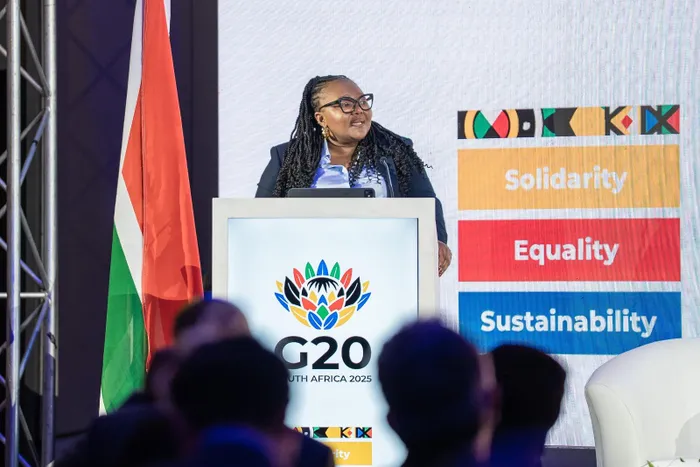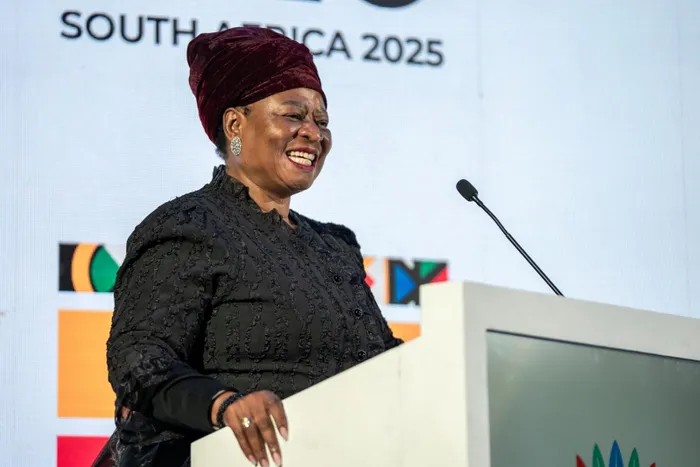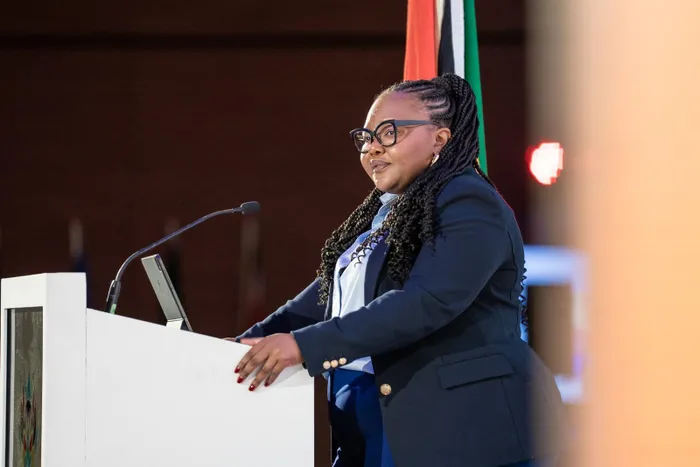G20 Basic Education Indaba: Department working on financial recovery plans for each province

Basic Education Minister Siviwe Gwarube painted a picture of the reality of the education system at the National G20 Basic Education Indaba.
Image: Department of Basic Education/Supplied
Department of Basic Education (DBE) Minister Siviwe Gwarube highlighted that several provinces in the country are facing severe financial constraints, but that they are facilitating the development of financial recovery plans for each of them, which include flushing out ghost learners and teachers.
Gwarube and Deputy Minister Dr Reginah Mhaule painted a picture of the reality of the education system at the National G20 Basic Education Indaba, where they touched on the understanding and learnings from across the various izindaba (plural of indaba).
Held in Cape Town under the theme: “Taking the G20 to the People – A National Indaba for Advancing Quality Foundational Learning through Early Childhood Care and Education (ECCE) and Education Professional Development,” the indaba will strengthen the sector’s drive to ensure participation in the G20 is felt at all spheres.
Having traversed all nine provinces in the country, the Indaba will see the sector gather to deliberate on crucial provincial insights ahead of the Ministerial Meeting of the Education Working Group in October 2025.
Mhaule explained that as Chair of the G20 Education Working Group (EdWG), South Africa advanced three strategic priorities:
- Quality Foundational Learning, with a strong emphasis on ECCE
- Mutual Recognition of Qualifications, to support mobility and lifelong learning,
- Education Professional Development for a Changing World, to elevate and equip the teaching workforce.
Mhaule added that the fourth and final meeting of the G20 Education Working Group—scheduled for October in Skukuza, Mpumalanga—will culminate in a Ministerial Summit where we aim to adopt a Declaration of Shared Vision and Commitment.

Deputy Education Minister Dr Reginah Mhaule painted a picture of the reality of the education system at the National G20 Basic Education Indaba.
Image: Department of Basic Education/Supplied
“This declaration is not merely a ceremonial outcome; it is a strategic instrument that will anchor the key decisions, priorities, and insights gathered throughout our G20 engagements.
“It will serve as a guiding framework for translating global dialogue into national and provincial action, ensuring that our commitments to foundational learning and teacher development are embedded in policy and practice,” Mhaule said.
“For South Africa, this Declaration offers a unique opportunity to align our reform agenda with global best practice, while foregrounding the voices and realities of our provinces. It will help us move from aspiration to implementation—strengthening accountability, mobilising resources, and sustaining momentum well beyond our G20 presidency.”
In her keynote address, Gwarube said that ECCE is not an optional extra.
“It is the foundation on which everything else rests. If we fail to get quality foundational learning right, we undermine every other reform,” Gwarube said.
“Through the provincial izindaba, we have created a space where voices from every corner of our country could be heard, where ideas were tested, and where solutions emerged that speak directly to the realities in our schools and communities.
“This Indaba is about consolidating insights received from all the provincial editions, elevating the voices of our people, and shaping the future of education in the spirit of solidarity, equality and sustainability,” she said.

Basic Education Minister Siviwe Gwarube highlighted that several provinces in the country are facing severe financial constraints.
Image: Department of Basic Education/Supplied
Gwarube added that they’ve heard from voices from across the provinces. The Eastern Cape to Limpopo communities are finding ways to expand access to early childhood care, to support parents, to deliver infrastructure where it is most needed, Gwarube said.
“A number of provinces are facing severe financial constraints; they are struggling to pay for learning and teaching materials, for scholar transport, infrastructure programmes and other essential services,” Gwarube said.
“We have facilitated the development of financial recovery plans for each province and that will include a verification of warm bodies, to flush out ghost teachers who drain the cost of employee budgets and also to flush out ghost learners who drain the norms and standards budget.
“We have a thorny road ahead of us to turn around the financial situation of provincial departments of education, but we have no other choice; we must cut our garments to fit the cloth,” she said.
She added that to deal with some of these systematic issues, she has operationalised the National Education and Training Council, an advisory body made up of experts, who will advise on a minimum integrated package of support to schools offering the Foundation Phase.
They will also advise on how the DBE should strengthen the resourcing model for schools, as well as reviewing the promotion and progression policies in the system and how to reduce the administrative burden on teachers.
“We are working on finding long-term solutions to the more systematic challenges facing the sector, and we are going to be evidence-led in our approach.”
theolin.tembo@inl.co.za